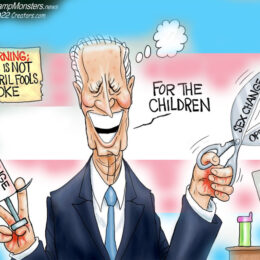Wall Street Journal | by HOLMAN W. JENKINS, JR. | Sep. 29, 2009
The public wasn’t dumb enough to believe the public option would save money.
Someday this country will have a health-care debate that’s not abject in its idiocy. It will involve a term used by Congressional Budge Office chief Doug Elmendorf, who has become a notoriety for harping on the word “incentives.” The same word was used the other day by Warren Buffett, about what’s missing from the health-care plan on Capitol Hill.
We actually prefer the formulation of Duke University’s Clark Havighurst, who speaks of restoring the “price tags” to health care.
Now that’s a concept that the public could actually make sense of.
President Barack Obama made a “public option” his centerpiece not because it’s the answer to what’s broken in the U.S. system, but because it’s a halfway house to a single-payer setup that liberal Democrats have always wanted. Team Obama also knew the public is concerned about rising costs, so they jammed together a hooey-filled argument that the public option was somehow the solution to rising costs.
The public is not as dumb as it’s made out to be, and Mr. Obama’s public option died a bipartisan death yesterday in the Senate Finance Committee. What’s left is a package of “reforms” that are mere trite extensions of what we’ve been doing for decades. That is, piling up mandates on private insurers and then lying that this somehow isn’t driving up the cost of health insurance; piling up subsidies for health consumption and then lying that this somehow isn’t responsible for runaway health-care spending.
Yes, the politics are difficult when it comes to restoring price tags. Voters would have to understand how a tax code that allowed them to choose for themselves how much of their incomes to devote to health care would serve their interests.
They would have to be persuaded of the benefits of a marketplace where insurers are free to design policies to appeal to different budgets and needs.
They might have to decide for themselves whether they have better uses for their income and savings than extending life at all cost.
In that sense, the jabbering on Capitol Hill is irrelevant to the central problem, wherein consumers see larger and larger chunks of their income mysteriously and involuntarily sucked into health care for questionable benefit.
A few brave legislators, including Democrat Ron Wyden, are willing to say as much. But as Max Baucus put it in an unguarded comment to the Washington Post: “Basically the president is not helping.”
Mr. Obama may be “not helping” because he doesn’t understand or believe in the role of absent price tags in creating our current woes. He may genuinely favor a system in which government decides who will receive what care.
However, he’s certainly also “not helping” because his base in organized labor doesn’t want real reform.
Union members not only like the tax-free, open-ended health -care benefits they’re used to getting. More important and often overlooked, organized labor itself is increasingly made up of health-care workers who benefit from an incentive system that artificially force-feeds great gobs of GDP into the industry’s maw.
Their long retreat elsewhere in the economy may continue unabated, but unions are steadily growing their clout in government and health care, two sectors that increasingly overlap and would become even more overlapped under the bills in Congress. Consider a scheme being test-driven in Missouri, where Democratic Gov. Jay Nixon, AFSCME and SEIU last year backed a ballot proposition to create a “Missouri Quality Homecare Council.”
. . . more



